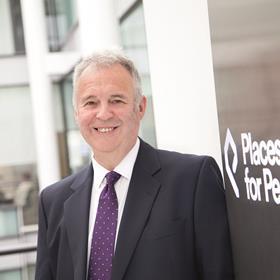The use of environmental, social and governance (ESG) reporting is increasing. A company’s ESG strategy and its priorities largely depend on the type of business, its sector and overall purpose, but the ultimate aim for any organisation should be to make a tangible difference to society.

When providing new homes and communities, we have a responsibility to make a positive social, economic and environmental impact. This approach has been at the heart of what Places for People does for some years; our first corporate social responsibility report was published in 2013. Our ESG report, published in December, is our latest iteration of that. Our commitment to creating social value and making a positive difference to society is as strong as ever, but has evolved in the way we make a difference and how we measure it.
We deliver a wide range of social-value activity through our core work in creating communities, including providing specialist support to customers, building affordable homes and community infrastructure, such as leisure centres, and providing employment or training opportunities. We also offer grants, sponsorship and volunteering to charities, as well as social investment.
Our social value activities are coordinated by Places Impact. This includes managing the Places Foundation, a charitable body supported by the group.
Our social value work addresses four customer priorities: physical and mental wellbeing; economic and social opportunities; digital and financial inclusion; and sustainable and resilient communities. We use commercial approaches to deliver social outcomes and all our profit is reinvested to make a difference to places, people and the planet.
The ultimate aim should be to make a tangible difference to society
Over the past year, we have helped tackle challenging issues in society and supported people to reach their potential. For example, our Affordable Housing Customer Taskforce has created significant social value during the Covid-19 lockdown by contacting more than 59,000 households, with 2,800 customers receiving additional support and 12,500 a regular weekly call. Support included financial assistance, help to register for online services, arranging shopping, accessing local authority hubs including food banks, signposting to specialist agencies, and visits from our response team.
With the support of Places Impact, our companies have identified opportunities for collaboration and third-party investment. These include the Lancashire Building Better Opportunities project, funded by the European Social Fund and the National Lottery Community Fund, which has achieved more than 400 positive outcomes for economically inactive or unemployed people, including employment, training and volunteering opportunities.
Creating sustainable places
We make a long-term commitment to help communities thrive and be sustainable. For example, Places for People is a founding partner in the Chorley Youth Zone, a facility for the town’s young people aged eight to 19 (up to 25 for those with disabilities), and has provided £75,000 in funding. More than 5,000 people registered at the centre in its first year and it has received more than 30,000 visits.

Our social investment activities create further impact. The Places Foundation is a partner in the Power Up Programme run by Big Issue Invest and brings together the private, public and third sectors to support Scottish early-stage social enterprises through investment, mentorship and pro-bono support.
The programme has injected £870,000 into 19 social businesses to help them respond to the Covid-19 crisis by providing meals to high-risk individuals, supporting disabled people and providing accommodation for those experiencing homelessness.
When it comes to environmental strategy, we focus on working to eliminate carbon emissions from our activities. One recent investment is in heat battery technology to help broaden our understanding of how to decarbonise heating in homes. We are installing high-performance heat batteries in many locations and working with suppliers to advance this technology so it can be scaled up across our stock.
Places for People is also part of an international consortium named SHIFFT, with nine partners from four countries, which is encouraging the adoption of low-carbon heating in existing residential and community buildings.
Unprecedented social, economic and environmental challenges globally mean ESG strategies are more important than ever before. There is no right or wrong answer to how to approach ESG and as a group, we are still learning.
However, it requires far more than a tick in the environmental, social and governance boxes. ESG strategies must align with a company’s long-term vision and translate into activities that will make a measurable difference to society and the environment.
David Cowans is group chief executive of Places for People






























No comments yet